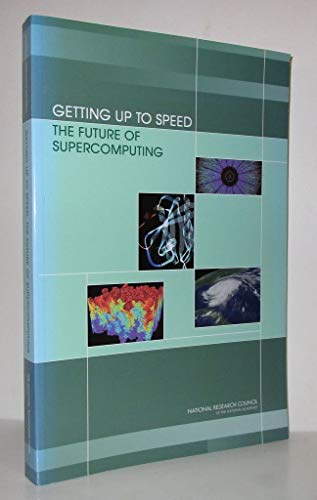National Research Council Division on Engineering and Physical Sciences Computer Science and Telecommunications Board Committee on the Future of Supercomputing (3 results)
FeedbackSearch filters
Product Type
- All Product Types
- Books (3)
- Magazines & Periodicals (No further results match this refinement)
- Comics (No further results match this refinement)
- Sheet Music (No further results match this refinement)
- Art, Prints & Posters (No further results match this refinement)
- Photographs (No further results match this refinement)
- Maps (No further results match this refinement)
- Manuscripts & Paper Collectibles (No further results match this refinement)
Condition Learn more
- New (No further results match this refinement)
- As New, Fine or Near Fine (1)
- Very Good or Good (2)
- Fair or Poor (No further results match this refinement)
- As Described (No further results match this refinement)
Binding
- All Bindings
- Hardcover (No further results match this refinement)
- Softcover (3)
Collectible Attributes
- First Edition (1)
- Signed (No further results match this refinement)
- Dust Jacket (No further results match this refinement)
- Seller-Supplied Images (No further results match this refinement)
- Not Print on Demand (3)
Language (1)
Price
- Any Price
- Under US$ 25
- US$ 25 to US$ 50
- Over US$ 50 (No further results match this refinement)
Free Shipping
- Free Shipping to U.S.A. (No further results match this refinement)
Seller Location
Seller Rating
-
Getting Up to Speed: The Future of Supercomputing
Published by National Academies Press, 2005
ISBN 10: 0309095026 ISBN 13: 9780309095020
Language: English
Seller: Once Upon A Time Books, Siloam Springs, AR, U.S.A.
paperback. Condition: Good. This is a used book in good condition and may show some signs of use or wear . This is a used book in good condition and may show some signs of use or wear .
-
Getting Up to Speed: The Future of Supercomputing
Published by National Academies Press, 2005
ISBN 10: 0309095026 ISBN 13: 9780309095020
Language: English
Seller: Calliopebooks, Potomac, MD, U.S.A.
Paperback. Condition: Like New. B2005. National Academies Press. Like New Condition, appears unread; unmarked clean tight and bright. Very Prompt shipping with tracking.
-
The Future of Supercomputing; An Interim Report
Published by The National Academies Press, Washington D.C., 2003
ISBN 10: 0309089956 ISBN 13: 9780309089951
Language: English
Seller: Ground Zero Books, Ltd., Silver Spring, MD, U.S.A.
First Edition
Trade paperback. Condition: Very good. Jennifer M. Bishop (Cover design) (illustrator). Presumed First Edition, First printing. xii, 46 pages. Footnotes. Acronyms. Cover has slight wear and soling. The committee assessed the status of supercomputing in the United States, including the characteristics of relevant systems and architecture research in government, industry, and academia and the characteristics of the market. The committee examined key elements of context--the history of supercomputing, research investment, the needs of government agencies for supercomputing capabilities--and assessed options for progress. Key historical or causal factors were identified. The committee examined the changing nature of problems demanding supercomputing (e.g., weapons design, modeling and simulation, cryptanalysis, climate modeling) and the implications for systems design. This is its interim report. This report provides a preliminary outline of the state of U.S. supercomputing today, the needs for the future, and the factors that contribute to meeting those needs. This interim report establishes context--including the history and current state of supercomputing, application requirements, technology evolution, the socioeconomic context--to identify some of the issues that may be explored in more depth in the second phase of the study. The study sought to understand the role of national security in the supercomputer market and the federal interest in supercomputing.



